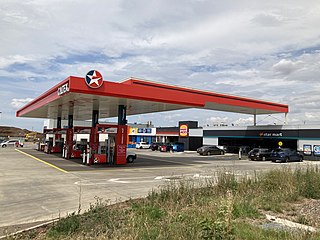A lubricant is a substance that helps to reduce friction between surfaces in mutual contact, which ultimately reduces the heat generated when the surfaces move. It may also have the function of transmitting forces, transporting foreign particles, or heating or cooling the surfaces. The property of reducing friction is known as lubricity.

Motor oil, engine oil, or engine lubricant is any one of various substances used for the lubrication of internal combustion engines. They typically consist of base oils enhanced with various additives, particularly antiwear additives, detergents, dispersants, and, for multi-grade oils, viscosity index improvers. The main function of motor oil is to reduce friction and wear on moving parts and to clean the engine from sludge and varnish (detergents). It also neutralizes acids that originate from fuel and from oxidation of the lubricant (detergents), improves the sealing of piston rings, and cools the engine by carrying heat away from moving parts.

Fuel oil is any of various fractions obtained from the distillation of petroleum. Such oils include distillates and residues. Fuel oils include heavy fuel oil, marine fuel oil (MFO), furnace oil (FO), gas oil (gasoil), heating oils, diesel fuel, and others.

Synthetic oil is a lubricant consisting of chemical compounds that are artificially modified or synthesised. Synthetic lubricants can be manufactured using chemically modified petroleum components rather than whole crude oil, but can also be synthesized from other raw materials. The base material, however, is still overwhelmingly crude oil that is distilled and then modified physically and chemically. The actual synthesis process and composition of additives is generally a commercial trade secret and will vary among producers.

Gear oil is a lubricant made specifically for transmissions, transfer cases, and differentials in automobiles, trucks, and other machinery. It has high viscosity and usually contains organosulfur compounds. Some modern automatic transaxles do not use a heavy oil at all but lubricate with the lower viscosity hydraulic fluid, which is available at pressure within the automatic transmission. Gear oils account for about 20% of the lubricant market.

China Petroleum & Chemical Corporation (中国石油化工股份有限公司), or Sinopec, is a Chinese oil and gas enterprise based in Beijing. It is listed in Hong Kong and also trades in Shanghai.

Petroleum products are materials derived from crude oil (petroleum) as it is processed in oil refineries. Unlike petrochemicals, which are a collection of well-defined usually pure organic compounds, petroleum products are complex mixtures. Most petroleum is converted into petroleum products, which include several classes of fuels.

AMSOIL Inc. is an American corporation based in Superior, Wisconsin that primarily formulates and packages synthetic lubricants, fuel additives, and filters. Company founder Albert J. Amatuzio developed several synthetic motor oil formulations throughout the mid-to-late 1960s. He was commercially selling synthetic motor oil by 1968. In 1972, AMSOIL 10W-40 Synthetic Motor Oil became the world's first synthetic motor oil to meet American Petroleum Institute requirements, which prompted the company to adopt "The First in Synthetics®" as its tagline. The company introduced several other synthetic lubricants that represented industry firsts throughout the 1970s and early 1980s. It distributes products in North America via a network of independent dealers paid commissions on sales.

Dexron is the trade name for a group of technical specifications for automatic transmission fluid (ATF) created by General Motors (GM). The name was first registered as a trademark and later evolved into a brand of GM. GM licenses the name and specifications to companies that manufacture the fluid and sell it under their own brand names. Not all Dexron fluids are licensed by GM for reselling under another brand name. To be licensed, the product must have a license number that begins with the letters B through J and include a "Dexron Approved" sticker on its container. Like many automobile manufacturers, GM uses transmissions sourced from other suppliers or transmission manufacturers around the world; many of these may use their own unique fluid.

Caltex is a petroleum brand name of Chevron Corporation used in the Asia-Pacific region, the Middle East, and Southern Africa. Headquartered in Singapore, it is also the brand name of non-Chevron petroleum companies in some countries under a trademark licensing agreement with Chevron.
Oil additives are chemical compounds that improve the lubricant performance of base oil. The manufacturer of many different oils can utilize the same base stock for each formulation and can choose different additives for each specific application. Additives comprise up to 5% by weight of some oils.
The Lubrizol Corporation is an American provider of specialty chemicals for the transportation, industrial and consumer markets. These products include additives for engine oils and other transportation-related fluids, additives for industrial lubricants, and additives for gasoline and diesel fuel. In addition, Lubrizol makes ingredients and additives for personal care products, pharmaceuticals and medical devices, specialty materials, including plastics technology, and coatings in the form of specialty resins and additives.
Gushan Environmental Energy Limited, is a biodiesel producer in China that was incorporated on May 16, 2006. The Company produces biodiesel and by-products of biodiesel production, including glycerol, plant asphalt, erucic acid and erucic amide. Biodiesel is a renewable, clean-burning and biodegradable fuel produced from a variety of feedstocks, such as vegetable oil, animal fat and recycled cooking oil. Currently there are 5 production facilities located in Beijing, Shanghai, Mianyang in Sichuan province, Handan in Hebei province and Fuzhou in Fujian province, serving the northern, interior and southeastern regions of China respectively. Biodiesel is used to fuel a range of diesel engines, typically after blending with diesel, including diesel engines found in trucks, mass transit vehicles, marine vessels and generators. The by-products of its biodiesel production have commercial applications in the food, pharmaceutical and manufacturing industries. The Company sells its products in China to direct users, including marine vessel operators, petroleum wholesalers and individual retail gas stations. The Company primarily uses vegetable oil offal and used cooking oil to produce biodiesel. It acquires the raw materials supply for each of its production facilities primarily from local suppliers.

China Petrochemical Corporation or Sinopec Group is the world's largest oil refining, gas and petrochemical conglomerate, administered by SASAC for the State Council of the People's Republic of China. It is headquartered at Chaoyangmenwai in Beijing, across the road from the headquarters of fellow state-owned oil company and competitor CNOOC Group.

The Chevron Richmond Refinery is a 2,900-acre (1,200 ha) petroleum refinery in Richmond, California, on San Francisco Bay. It is owned and operated by Chevron Corporation and employs more than 1,200 workers, making it the city's largest employer. The refinery processes approximately 240,000 barrels (38,000 m3) of crude oil a day in the manufacture of petroleum products and other chemicals. The refinery's primary products are motor gasoline, jet fuel, diesel fuel and lubricants.

Automotive oil recycling involves the recycling of used oils and the creation of new products from the recycled oils, and includes the recycling of motor oil and hydraulic oil. Oil recycling also benefits the environment: increased opportunities for consumers to recycle oil lessens the likelihood of used oil being dumped on lands and in waterways. For example, one gallon of motor oil dumped into waterways has the potential to pollute one million gallons of water.

NewMarket Corporation is a publicly traded, company that primarily serves the petroleum additives industry. The company is based in Richmond, Virginia, and has operations in North America, Latin America, Europe, the Middle East and Asia Pacific. The company's predecessor, the Albemarle Paper Manufacturing Company, was founded in 1887.
Afton Chemical Corporation develops and manufactures petroleum additives, including driveline, engine oil, fuel and industrial additives. Afton Chemical Corporation is headquartered in Richmond, Virginia, and has operations around the world. The company is a subsidiary of NewMarket Corporation, a corporation specializing in performance specialty chemicals.
Pour point depressants are used to allow the use of petroleum based mineral oils at lower temperatures. The lowest temperature at which a fuel or oil will pour is called a pour point. Wax crystals, which form at lower temperatures, may interfere with lubrication of mechanical equipment. High-quality pour point depressants can lower a pour point of an oil additive by as much as 40°C.
Selda Gunsel is a Turkish-American chemical engineer. She is currently President of Shell Global Solutions and Vice President (VP) for Global Commercial Technology at Royal Dutch Shell.













